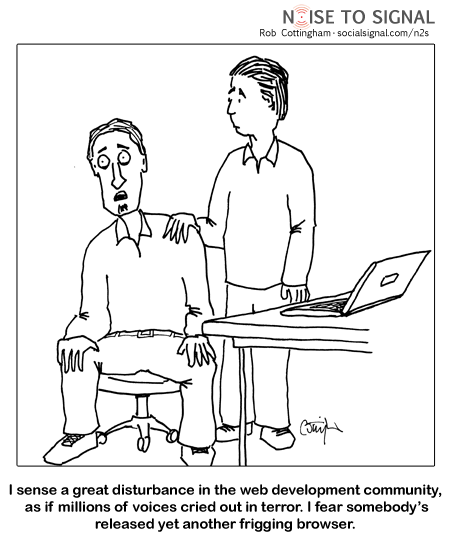Here is a pile of quotes and anti-anecdotes relating to software development and programming in general. The quotes where compiled by digging through the mining the rants from Juixe TechKnow. The collection of programming quotes is available as a PDF document and can be found on scribd.

Your code does not start at the compiler nor does it stop at the JVM.
One lesson that most developers don’t learn is to debug outside the debugger. As an engineer there are times when you need to troubleshot, problem solve, and debug not just your software from the comforts of your favorite IDE but the whole software stack, network, hardware, user’s environment, and even the user himself.
You can unit test and statically analysis software, but you can’t probe your users.
Every problem, issue, and bug experienced by the end user directly and indirectly with your software eventually needs to be implicitly and explicitly dealt with by your software development team.
I wish development teams spend more time streamlining their process rather than prematurely optimizing their code.
It is OK to have software with bugs, bugs can be fixed. It is not OK to have software with excuses!
Learn, plan, design, code, integrate, build, release, rinse, and repeat.
Management has a way of over emphasizing the blatantly obvious.
I’m a lazy loading type of programmer.
I’ve discovered that Windows security is an oxymoron!
I know that techies, myself included, are always bragging about how their code is poetry but I have never meet a poet laureate in a development team.
Remixing and mashing up Google Maps and Flickr is like the ‘Hello, World’ first program of Web 2.0 mashups.
Open Source code equals community.
As a rule of thumb, I never cache, pool, or use as singleton mutable objects.
Bugs by nature are out of the box, as a developer, you need to expand the box.
WWGD: What would Google do?
At some companies, the term Spec stands for Speculation.
I went to school to learn how to program software applications, which inevitably have bug defects. There was no course at my university on testing, debugging, profiling, or optimization. These things you have to learn on your own, usually in a tight deadline.
To most Java developers, Ruby/Rails is like a mistress. Ruby/Rails is young, new, and exciting; but eventually we go back to old faithful, dependable, and employable Java with some new tricks and idioms and we are the better programmer for it.
You might as well hire your your customers and pay them 50K/year because they are your new QA.
There is a saying, those who can, do; those who can’t, teach. It can be said that in software engineering, those who can, code, those who can’t, manage.
The greatest thing about Ruby on Rails is neither Ruby nor Rails, the best aspect of Rails is that it questioned the ‘best practices’ (and worst nightmares) of the current state of web development with its philosophy of Convention over Configuration and Don’t Repeat Yourself principle.
Continue reading

